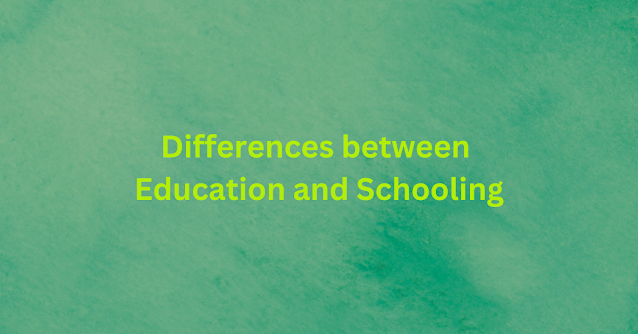| Sl. No. |
Differences |
Education |
Schooling |
| 1. |
Meaning |
It is a comprehensive term |
It has narrow meaning used to define a specific term |
| 2. |
Scope |
Its scope is wide, covering all-round growth and development of the individual |
The scope of schooling is limited and close ended |
| 3. |
Duration |
It is a life-long and continuous process |
It has limited duration and it ends after 10 or 12 years |
| 4. |
Coverage |
It includes all types of education - formal, informal and non-formal education |
School covers formal education only |
| 5. |
Aims |
Physical, mental, social, spiritual, moral, aesthetic development |
Mental development is the only aim of schooling |
| 6. |
Nature |
Education is a natural process |
Schooling is an artificial process |
| 7. |
Place |
Places of education include home, educational institutions, market, business place, religious institution, hospitals, library, museums, radio, computer, television etc. |
School is the only place for schooling. (Primary, Middle, High and Higher Secondary Schools) |
| 8. |
Curriculum |
Generally, curriculum of education is not pre-determined except formal education which emphasises curriculum |
The act of school is pre-determined and fixed. It is limited to specific subjects and activities |
| 9. |
Agents |
The agents of education are teacher, parents, relatives, friends, neighbours etc. |
Teacher is the only agent who plays the most important role in schooling |
| 10. |
Teaching methods |
A number of teaching methods are followed according to the needs of the pupil and the nature of the subjects |
Definite and fixed methods of teaching are adopted. Generally, lecture, dictation, demonstration, textbooks, experiments, projects and questions answer methods are in usage |
| 11. |
Discipline |
Social discipline and social control in education except informal education |
Discipline is maintained in schooling for which instruction is provided |
| 12. |
Relation |
There is formal and informal relations between the teachers and the pupils |
Formal relations between the teacher and the taught |
| 13. |
Evaluation |
A comprehensive set of evaluation tools are used to assess the pupils' performance |
Evaluation is made on the basis of student's performance in tests and examinations |
| 14. |
Practicality |
Place for more practicality than theoreticality |
Place for maximum theoreticality and minimum practicality |
| 15. |
Results |
The results of education are good citizens and cultured people. There is no place for certificates or degrees except formal and non-formal education |
The results of schooling are literate people. Certificates are issued to the students who pass in the relevant examinations |



